Chujie Zheng
Outcome Accuracy is Not Enough: Aligning the Reasoning Process of Reward Models
Feb 04, 2026Abstract:Generative Reward Models (GenRMs) and LLM-as-a-Judge exhibit deceptive alignment by producing correct judgments for incorrect reasons, as they are trained and evaluated to prioritize Outcome Accuracy, which undermines their ability to generalize during RLHF. We introduce Rationale Consistency, a fine-grained metric that quantifies the alignment between the model's reasoning process and human judgment. Our evaluation of frontier models reveals that rationale consistency effectively discriminates among state-of-the-art models and detects deceptive alignment, while outcome accuracy falls short in both respects. To mitigate this gap, we introduce a hybrid signal that combines rationale consistency with outcome accuracy for GenRM training. Our training method achieves state-of-the-art performance on RM-Bench (87.1%) and JudgeBench (82%), surpassing outcome-only baselines by an average of 5%. Using RM during RLHF, our method effectively improves performance as demonstrated on Arena Hard v2, notably yielding a 7% improvement in creative writing tasks. Further analysis confirms that our method escapes the deceptive alignment trap, effectively reversing the decline in rationale consistency observed in outcome-only training.
Group Sequence Policy Optimization
Jul 24, 2025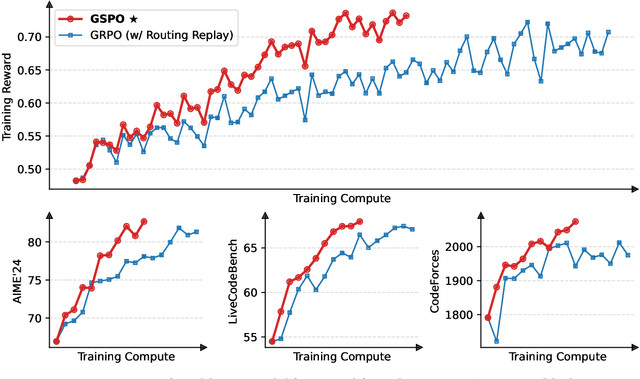

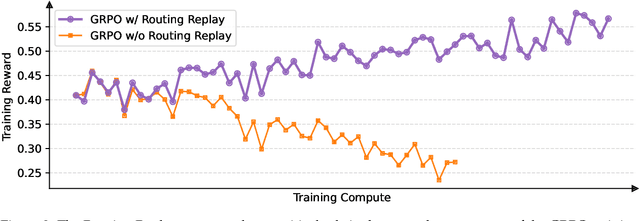
Abstract:This paper introduces Group Sequence Policy Optimization (GSPO), our stable, efficient, and performant reinforcement learning algorithm for training large language models. Unlike previous algorithms that adopt token-level importance ratios, GSPO defines the importance ratio based on sequence likelihood and performs sequence-level clipping, rewarding, and optimization. We demonstrate that GSPO achieves superior training efficiency and performance compared to the GRPO algorithm, notably stabilizes Mixture-of-Experts (MoE) RL training, and has the potential for simplifying the design of RL infrastructure. These merits of GSPO have contributed to the remarkable improvements in the latest Qwen3 models.
A Survey on Latent Reasoning
Jul 08, 2025


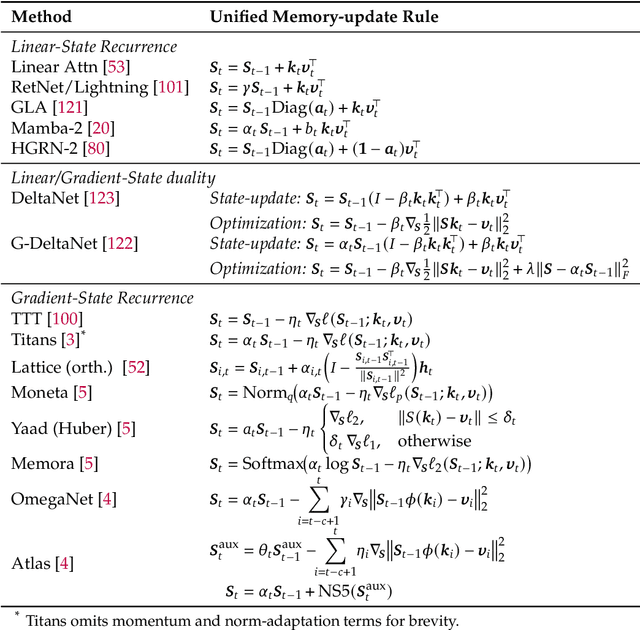
Abstract:Large Language Models (LLMs) have demonstrated impressive reasoning capabilities, especially when guided by explicit chain-of-thought (CoT) reasoning that verbalizes intermediate steps. While CoT improves both interpretability and accuracy, its dependence on natural language reasoning limits the model's expressive bandwidth. Latent reasoning tackles this bottleneck by performing multi-step inference entirely in the model's continuous hidden state, eliminating token-level supervision. To advance latent reasoning research, this survey provides a comprehensive overview of the emerging field of latent reasoning. We begin by examining the foundational role of neural network layers as the computational substrate for reasoning, highlighting how hierarchical representations support complex transformations. Next, we explore diverse latent reasoning methodologies, including activation-based recurrence, hidden state propagation, and fine-tuning strategies that compress or internalize explicit reasoning traces. Finally, we discuss advanced paradigms such as infinite-depth latent reasoning via masked diffusion models, which enable globally consistent and reversible reasoning processes. By unifying these perspectives, we aim to clarify the conceptual landscape of latent reasoning and chart future directions for research at the frontier of LLM cognition. An associated GitHub repository collecting the latest papers and repos is available at: https://github.com/multimodal-art-projection/LatentCoT-Horizon/.
WorldPM: Scaling Human Preference Modeling
May 15, 2025Abstract:Motivated by scaling laws in language modeling that demonstrate how test loss scales as a power law with model and dataset sizes, we find that similar laws exist in preference modeling. We propose World Preference Modeling$ (WorldPM) to emphasize this scaling potential, where World Preference embodies a unified representation of human preferences. In this paper, we collect preference data from public forums covering diverse user communities, and conduct extensive training using 15M-scale data across models ranging from 1.5B to 72B parameters. We observe distinct patterns across different evaluation metrics: (1) Adversarial metrics (ability to identify deceptive features) consistently scale up with increased training data and base model size; (2) Objective metrics (objective knowledge with well-defined answers) show emergent behavior in larger language models, highlighting WorldPM's scalability potential; (3) Subjective metrics (subjective preferences from a limited number of humans or AI) do not demonstrate scaling trends. Further experiments validate the effectiveness of WorldPM as a foundation for preference fine-tuning. Through evaluations on 7 benchmarks with 20 subtasks, we find that WorldPM broadly improves the generalization performance across human preference datasets of varying sizes (7K, 100K and 800K samples), with performance gains exceeding 5% on many key subtasks. Integrating WorldPM into our internal RLHF pipeline, we observe significant improvements on both in-house and public evaluation sets, with notable gains of 4% to 8% in our in-house evaluations.
Qwen3 Technical Report
May 14, 2025
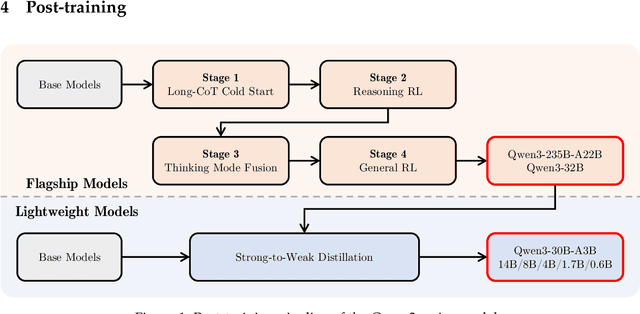

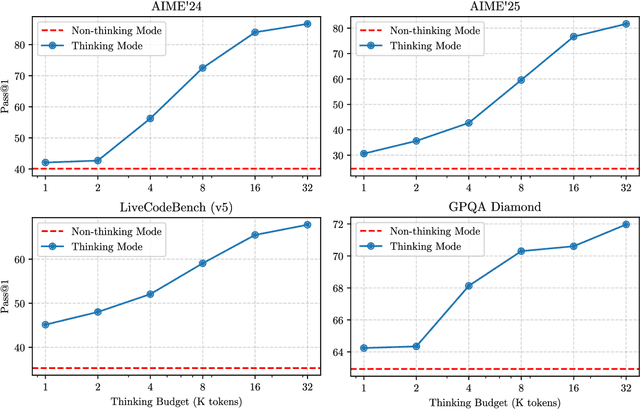
Abstract:In this work, we present Qwen3, the latest version of the Qwen model family. Qwen3 comprises a series of large language models (LLMs) designed to advance performance, efficiency, and multilingual capabilities. The Qwen3 series includes models of both dense and Mixture-of-Expert (MoE) architectures, with parameter scales ranging from 0.6 to 235 billion. A key innovation in Qwen3 is the integration of thinking mode (for complex, multi-step reasoning) and non-thinking mode (for rapid, context-driven responses) into a unified framework. This eliminates the need to switch between different models--such as chat-optimized models (e.g., GPT-4o) and dedicated reasoning models (e.g., QwQ-32B)--and enables dynamic mode switching based on user queries or chat templates. Meanwhile, Qwen3 introduces a thinking budget mechanism, allowing users to allocate computational resources adaptively during inference, thereby balancing latency and performance based on task complexity. Moreover, by leveraging the knowledge from the flagship models, we significantly reduce the computational resources required to build smaller-scale models, while ensuring their highly competitive performance. Empirical evaluations demonstrate that Qwen3 achieves state-of-the-art results across diverse benchmarks, including tasks in code generation, mathematical reasoning, agent tasks, etc., competitive against larger MoE models and proprietary models. Compared to its predecessor Qwen2.5, Qwen3 expands multilingual support from 29 to 119 languages and dialects, enhancing global accessibility through improved cross-lingual understanding and generation capabilities. To facilitate reproducibility and community-driven research and development, all Qwen3 models are publicly accessible under Apache 2.0.
SuperGPQA: Scaling LLM Evaluation across 285 Graduate Disciplines
Feb 20, 2025Abstract:Large language models (LLMs) have demonstrated remarkable proficiency in mainstream academic disciplines such as mathematics, physics, and computer science. However, human knowledge encompasses over 200 specialized disciplines, far exceeding the scope of existing benchmarks. The capabilities of LLMs in many of these specialized fields-particularly in light industry, agriculture, and service-oriented disciplines-remain inadequately evaluated. To address this gap, we present SuperGPQA, a comprehensive benchmark that evaluates graduate-level knowledge and reasoning capabilities across 285 disciplines. Our benchmark employs a novel Human-LLM collaborative filtering mechanism to eliminate trivial or ambiguous questions through iterative refinement based on both LLM responses and expert feedback. Our experimental results reveal significant room for improvement in the performance of current state-of-the-art LLMs across diverse knowledge domains (e.g., the reasoning-focused model DeepSeek-R1 achieved the highest accuracy of 61.82% on SuperGPQA), highlighting the considerable gap between current model capabilities and artificial general intelligence. Additionally, we present comprehensive insights from our management of a large-scale annotation process, involving over 80 expert annotators and an interactive Human-LLM collaborative system, offering valuable methodological guidance for future research initiatives of comparable scope.
Aligning Instruction Tuning with Pre-training
Jan 16, 2025



Abstract:Instruction tuning enhances large language models (LLMs) to follow human instructions across diverse tasks, relying on high-quality datasets to guide behavior. However, these datasets, whether manually curated or synthetically generated, are often narrowly focused and misaligned with the broad distributions captured during pre-training, limiting LLM generalization and effective use of pre-trained knowledge. We propose *Aligning Instruction Tuning with Pre-training* (AITP), a method that bridges this gap by identifying coverage shortfalls in instruction-tuning datasets and rewriting underrepresented pre-training data into high-quality instruction-response pairs. This approach enriches dataset diversity while preserving task-specific objectives. Evaluations on three fully open LLMs across eight benchmarks demonstrate consistent performance improvements with AITP. Ablations highlight the benefits of adaptive data selection, controlled rewriting, and balanced integration, emphasizing the importance of aligning instruction tuning with pre-training distributions to unlock the full potential of LLMs.
The Lessons of Developing Process Reward Models in Mathematical Reasoning
Jan 13, 2025



Abstract:Process Reward Models (PRMs) emerge as a promising approach for process supervision in mathematical reasoning of Large Language Models (LLMs), which aim to identify and mitigate intermediate errors in the reasoning processes. However, the development of effective PRMs faces significant challenges, particularly in data annotation and evaluation methodologies. In this paper, through extensive experiments, we demonstrate that commonly used Monte Carlo (MC) estimation-based data synthesis for PRMs typically yields inferior performance and generalization compared to LLM-as-a-judge and human annotation methods. MC estimation relies on completion models to evaluate current-step correctness, leading to inaccurate step verification. Furthermore, we identify potential biases in conventional Best-of-N (BoN) evaluation strategies for PRMs: (1) The unreliable policy models generate responses with correct answers but flawed processes, leading to a misalignment between the evaluation criteria of BoN and the PRM objectives of process verification. (2) The tolerance of PRMs of such responses leads to inflated BoN scores. (3) Existing PRMs have a significant proportion of minimum scores concentrated on the final answer steps, revealing the shift from process to outcome-based assessment in BoN Optimized PRMs. To address these challenges, we develop a consensus filtering mechanism that effectively integrates MC estimation with LLM-as-a-judge and advocates a more comprehensive evaluation framework that combines response-level and step-level metrics. Based on the mechanisms, we significantly improve both model performance and data efficiency in the BoN evaluation and the step-wise error identification task. Finally, we release a new state-of-the-art PRM that outperforms existing open-source alternatives and provides practical guidelines for future research in building process supervision models.
ProcessBench: Identifying Process Errors in Mathematical Reasoning
Dec 10, 2024



Abstract:As language models regularly make mistakes when solving math problems, automated identification of errors in the reasoning process becomes increasingly significant for their scalable oversight. In this paper, we introduce ProcessBench for measuring the ability to identify erroneous steps in mathematical reasoning. It consists of 3,400 test cases, primarily focused on competition- and Olympiad-level math problems. Each test case contains a step-by-step solution with error location annotated by human experts. Models are required to identify the earliest step that contains an error, or conclude that all steps are correct. We conduct extensive evaluation on ProcessBench, involving two types of models: process reward models (PRMs) and critic models, where for the latter we prompt general language models to critique each solution step by step. We draw two main observations: (1) Existing PRMs typically fail to generalize to more challenging math problems beyond GSM8K and MATH. They underperform both critic models (i.e., prompted general language models) and our own trained PRM that is straightforwardly fine-tuned on the PRM800K dataset. (2) The best open-source model, QwQ-32B-Preview, has demonstrated the critique capability competitive with the proprietary model GPT-4o, despite that it still lags behind the reasoning-specialized o1-mini. We hope ProcessBench can foster future research in reasoning process assessment, paving the way toward scalable oversight of language models.
Yi-Lightning Technical Report
Dec 03, 2024



Abstract:This technical report presents Yi-Lightning, our latest flagship large language model (LLM). It achieves exceptional performance, ranking 6th overall on Chatbot Arena, with particularly strong results (2nd to 4th place) in specialized categories including Chinese, Math, Coding, and Hard Prompts. Yi-Lightning leverages an enhanced Mixture-of-Experts (MoE) architecture, featuring advanced expert segmentation and routing mechanisms coupled with optimized KV-caching techniques. Our development process encompasses comprehensive pre-training, supervised fine-tuning (SFT), and reinforcement learning from human feedback (RLHF), where we devise deliberate strategies for multi-stage training, synthetic data construction, and reward modeling. Furthermore, we implement RAISE (Responsible AI Safety Engine), a four-component framework to address safety issues across pre-training, post-training, and serving phases. Empowered by our scalable super-computing infrastructure, all these innovations substantially reduce training, deployment and inference costs while maintaining high-performance standards. With further evaluations on public academic benchmarks, Yi-Lightning demonstrates competitive performance against top-tier LLMs, while we observe a notable disparity between traditional, static benchmark results and real-world, dynamic human preferences. This observation prompts a critical reassessment of conventional benchmarks' utility in guiding the development of more intelligent and powerful AI systems for practical applications. Yi-Lightning is now available through our developer platform at https://platform.lingyiwanwu.com.
 Add to Chrome
Add to Chrome Add to Firefox
Add to Firefox Add to Edge
Add to Edge